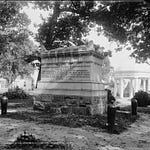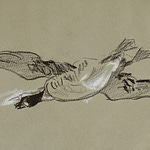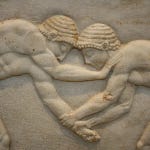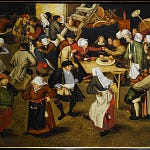Tiriolo—Little Tyre, a trading fortress founded by the ever-busy Phoenicians 2,500 years ago—would now be no more than a sleepy village, were it not for the herds of goats that crowd its streets in the early morning once a week, and the Italians that crowd them at all other hours. People live well in Tiriolo, by their easy standards: They have good food and clean clothes, and it hardly ever rains. They work, but they don’t blow trumpets before them as they go. So it didn’t surprise me when my cousins—all of them grown up, with families—decided one fall afternoon, in the middle of the week, not to win bread but to hunt mushrooms.
Do not suppose we had baskets for assiduous gathering. The larger breeds of mushrooms, or funghi as the Italians so accurately call them, are shy, hiding under a fall of rotten leaves or in the wet crook of a half-dead oak. I might sit on a rock with a commanding view of the hill, combating a kind of spore-grown heresy with Francesco, un Testimonio di Gehova, and not catch a single mushroom battening on the wind.
The poisonous ones, I was told, are small and white, like those we eat in America. The really good ones, never to be purchased but only to be found, are rare behemoths, gaudy yellow and streaky red, sometimes capped like the umbrellas we know, sometimes just slabs of flabby tofu. “What’s that thing?” I asked, warily. But they cried out, “ Antonio, hai fatto bene!” It was a crimson blotch that might have corrupted the liver of St. Peter himself. That was the success of the day. For three hours we shouted and argued and complained about the walk back uphill, and all we had for profit were a half-dozen fungi.
The cousins were sweaty and happy, and I was shaking my head, American that I am, calculating how many hours the three men had taken from work, how much they could have earned, and how many baskets of spores they could have bought with the wages. But cousin Adriana cooked the mushrooms in our supper, and though they tasted like any mushrooms—that is, they savored of warm mold and woody mildew—they were good, no one died of liver failure, and the bank did not come to repossess the furniture.
The Week’s Purpose
It wasn’t the Sabbath, but it might as well have been. My cousins should have been working, I thought. Man is supposed to work—most of us have little choice in the matter, or loudly protest that we have no choice—except on the Sabbath, when we rest. But is that all there is to the relation between the days? Might there be something about the Sabbath that makes for good work the day before? Can you enjoy the Sabbath rest in the midst of labor on Thursday? What kind of hard Thursday work—or Thursday play—is like Sunday feasting? And what is the Thursday work for, if not ultimately for feasting?
My mind returns to that day in Little Tyre whenever I forget that the end of the week, the purpose of the week, is its return to the feast in the beginning. The Sabbath is a gift for man, says Jesus, and not man the sacrifice for a grim and demanding Sabbath. Profit be damned. When you forget the Sabbath, you mistake the other days, too. When you forget the feast, you forget what your work is for.
Before the Lord cast Adam and Eve out of Eden, where the fruit of the vine hung bountiful and free, he had a few words to say to the man about his labor: “Cursed is the ground for thy sake: in sorrow shalt thou eat of it all the days of thy life: Thorns also and thistles shall it bring forth to thee; and thou shalt eat the herb of the field; In the sweat of thy face shalt thou eat bread, till thou return unto the ground; for out of it wast thou taken: for dust thou art, and unto dust shalt thou return.”
Now, one way to fight a curse—our modern way, I think—is to deny that it is a curse. If God says we shall eat our bread in the sweat of our brows, then we make an idol of necessity and worship the sweat of our brows. We say, “How hard have we worked to build that granary and stuff it with grain!” We hug ourselves for our intelligence, our diligence, our seizing of the main chance, our scratching a bare meal out of the flinty soil, a meal that in our memory grows ever barer as we grow older and better satisfied with our victorious perseverance. How did the famous woman, suddenly raised high on the national stage, become a lawyer of such station? “Not by staying home and baking cookies,” said she.
Now it is bad enough to have to sweat to please the whims of an imperious master, whether Nature or an Egyptian foreman; but to sweat to please the petty god of one’s small profit is a slavery as absurd as it is common. Old, too. No sooner are Adam and Eve driven from the garden than we are told of two workers, one who took care to do what was not worth his while, and one who did not. For the things most worth doing are those worth nothing: as a kiss that can be bought is not a kiss.
When Abel “brought of the firstlings of his flock and of the fat thereof,” he had to work to choose which sheep were the fattest and the finest. That was the work of worship, or the robust play of worship; and in one fine gesture of thanksgiving, as the flesh lay roasting on the stone of sacrifice, Abel enjoyed the tossing away of his profit, and so gained the favor of the Lord. His sweat became his blessing. But as for Cain, the church fathers say that when he “brought of the fruit of the ground an offering unto the Lord,” he chose whatever was to hand, heedlessly, and so his offering was rejected. Cain was no indolent man, as the world judges indolence. Wandering over the land of Nod, a restless exile, finding the ground ever harsher and stingier, Cain came to consummate his vagabondage by building a city. He was negligent not in farming but in offering away the fruits of his farming. To put it a different way, Cain never knew the restful sweat of the Sabbath.
Sweating for Bread
I said that Abel had turned a curse into a blessing, but in his grace the Lord does nothing but bless mankind, as he blessed Adam when he drove him from the garden, setting him free from an immortality of sin and alienation. Here I am not thinking about the so-called protevangelion, the first good news, the prophecy of a Redeemer who would come to crush the serpent’s head. Look at the curse again: “In the sweat of thy face shalt thou eat bread.” Bread—the first use of the word in Scripture.
Sweat was bread’s greatest ingredient: The grain had to be sown and tended and reaped; the stalks had to be thrashed and the chaff winnowed; the kernels had to be ground to powder, and in the days before mills and grindstones, that meant they had to be pounded in stone bowls by hand. Then came the kneading and baking—all for a dark, thick loaf that would easily be consumed by a single small family in a single meal.
If fruit is plentiful and nourishing, who would ever do something as laborious as bake bread? But for that very reason I like to think that, had man not sinned, we would have had bread in Eden, as we would have had art, and play, and garlands on the trees for days of worship. There would have been all kinds of generous things not worth doing, in praise of the God who labored six days over a world that profited him nothing to make.
Bread would then have been not the staff of life, but a very flag, gladdening the heart like the wine we would have washed it down with. Or so I imagine; I cannot pass an Italian house on baking day without feeling that the Sabbath has joined the grandmother in the kitchen and is floured with her up to the elbows.
No surprise that a Christian or a Jew should feel so. When the inspired author wrote of that bread to come, he knew there would fall from heaven a bread which man could never win and for which he was forbidden to work. For it came to pass that the Israelites, set free from Egypt through no exertion of their own save the sweat they shed unloading the Egyptians of their gold, began to murmur against Moses: “Would to God we had died by the hand of the Lord in the land of Egypt, where we sat by the flesh pots, and when we did eat bread to the full; for ye have brought us forth into this wilderness, to kill this whole assembly with hunger.”
Holiday Bread
At this point, a god of self-help, an American drudge-ethic god, would have commanded them to dig irrigation trenches or sow sacred kernels or do something else of the sedulous sort. God is not pleased with the people, true, but he grants them a bread that requires only bending down and gathering. It is a free, holiday bread, this manna, a funny who-knows-what, to be eaten with the foundling quail: “And when the dew that lay was gone up, behold, upon the face of the wilderness there lay a small round thing, as small as the hoar frost on the ground. And when the children of Israel saw it, they said to one another, It is manna: for they wist not what it was. And Moses said unto them, This is the bread which the Lord hath given you to eat.”
Every family is granted a measure of manna to be gathered by the men and the women and the children; enough is provided for everybody, and, on the day before the Sabbath, twice as much as enough. So “they gathered every man according to his eating.” But on the Sabbath no manna was to be gathered, nor was it to be saved beyond the Sabbath. Of course, to do so would be to violate the law requiring Sabbath rest. But more: it is to misunderstand both the manna and the Sabbath. To hoard manna is to regard it as a commodity for which one has labored and upon whose store one reckons, and not as a gift pure and simple. When the manna falls on every day but the Sabbath, it is the gift of the Sabbath that falls, and, regardless of the sore backs everybody must have had by evening, the celebratory “finding” of the little kernels is not like the stooping of a farmer over his stick-plow. Rather, it seasons all the days of the week with Sabbath cheer.
One must not, then, undo the blessing by reducing the Sabbath to sweat. No such work can prosper, as the few manna-grubbers found: “Notwithstanding they hearkened not unto Moses; but some of them left of it until the morning, and it bred worms, and stank.” But when the manna was boiled into porridge or baked into flatbread, “the taste of it was like wafers made with honey,” as sweet and delicate as the morning of a holiday.
Playing with Gargoyles
On the morning of the day before Thanksgiving, the smells of pumpkin pie a-baking come to me from downstairs. Maybe manna tasted a little like that, who knows, or maybe the pie is manna to me, because for all I have to do with its making, I might as well have found it hot and steaming under a tree, placed there by elves.
My wife’s cooking makes me think of all kinds of hard work leavened by play. I think of the turned porch posts of the old house we live in, and wonder that people so much poorer than we, with so many fewer days to see the sun rise and set, yet spent so much time, so much cramped muscle and sweat, to turn logs on a lathe and make them into ringed and scalloped posts, with calculus-defying curves, to look fine on a sunny day.
Why did they do that? Or why are Gothic cathedrals so playful? I have heard that gargoyles serve at least two practical purposes: Their weight helps nail down the pillars or buttresses they cap, and they make fine downspouts. But wouldn’t a large sluice of scooped stone have done as well? Some unknown sculptor, no doubt a gangly apprentice named Wat, labored over the comic-book grimaces and the googling eyes, sweating and (if his chisel missed the mark) swearing in the service of the Lord. That is, he labored and earned his handful of pence every day but the Sabbath day, yet I wager that if something of the Sabbath did not season his work on those other days, the demon’s grimace would not be quite so taut nor the leer quite so rakish. Neither does one buy gargoyles from a store.
In Leisure: The Basis of Culture, Joseph Pieper said that ours is a society of “total work,” with the weekend, that calendrical device for the maintenance of rested labor, having replaced the Sabbath. The weekend exists to make our labor on Monday-Tuesday-Wednesday-Thursday-Friday more productive, which is to say more efficient, which is to say not at all like the labor of baking pies, chiseling demons, hunting the wild mushroom, culling one’s best ram to sacrifice, or seething manna to pat into wafers. If anything, the spirit of Monday Unlimited has infiltrated the weekend too, as was to be expected given its lordship over those days, so that many of us now look at the weekend as the time when we can catch up on work.
The sin we commit when we allow work to crowd out celebration, said Pieper, is the one we are least likely to acknowledge, because our busyness hides the truth from us so well. It is sloth, that devil of the noonday sun. For sloth, he points out, is not only quite compatible with a society of total work, it is what such a society inevitably produces, and produces more efficiently than drywall and fiberglass.
Working Sin
Thomas Aquinas says that sloth is the sin against the Sabbath rest, not because it is a perversion of rest, but because it prevents us from enjoying the festivity, the wheat and the oil and the wine. Sloth is spiritual torpor. The body may run like a robot, accomplishing task after task, and deriving no joy from any of it; the soul that drives such a body is in the grip of that dead sin. You may get a lot done. So does a derrick, so does a winch.
And what of that work? What, at last, is the value of productivity, when the work is not shot through with care, with love, with the humility to dally upon the small? Some work, no doubt, has always been backbreaking and necessary. Farmers used to have to clear fields of stumps, from dawn to dusk, the men taking two weeks at the job, using axes and fire and oxen harnessed to pulleys and chains. But is there not at least some savor of hard celebration when two or three are gathered together to root up stumps, and sweat and swear, and set their aching arms and backs against the cold roots?
That work had to be done with care—care for one’s family; otherwise, your negligence would be scored on your plowshare soon enough. But work done for the sake of work, or work processed along the chain only for the sake of a salary or, worse, for power and prestige, is the work of a slave, the more slavish as it is the more voluntary. It is the manna scrambled up for the manna trough, and it grows wormy. It stinks to heaven.
As the gentle prophet might say, “Why spend your labor for what is not bread?” Why turn your back upon the festive day? The Sabbath, and work undertaken in its refreshing shadow, is too much celebration for our weak nerves, too much labor of heart and mind and soul for our impoverished will; at the same time, it is too humble a surrender to the God who made all creatures great and small. So we retreat from it, retreat from work into work.
I see this torpidity in my profession, literary studies, wherein young professors (I was one) are lashed and whipped into producing, according to our field’s own pyramidal templates, article after strawless article that turn the awe or joy of a Shakespeare into a political grind, a ducking and scraping for advancement. But to mesh in that machine is more comfortable than to confront the tremendous mystery of God and man that Shakespeare confronts. And the brand name of that machine—shut down on the weekends only to be oiled and made ready for the days that matter—is sloth.
Parents now hire other people to throw parties for their children. Do they hire other people to laugh, too, when their children prattle? Do they sublet their joy? Ah, so they do, at many dollars a day. We leave the labor of home to grind it out in the desert. Sure, it is a desert without manna, but not to worry: Its caravan routes are strewn on both sides with the same old fleshpots everywhere to help you make it through the dead and dry. Sloth sells, sloth pays.
One of the Fools
What do we work for, finally, if not somehow for life, and that in abundance? Again my thoughts turn to better people than I have been. My grandmother had terrible circulation in her legs all her born days, but she was too busy to sit down, unless it were to watch Gunsmoke with her husband. I see them still, each more a child than I: Two Italians cheering a sheriff named Dillon, laughing at the bad guy and holding a perfectly silly and animated conversation with the tube.
Even when cancer had withered her right arm, she would somehow swing her limbs and roll the dough for a great bowl of anise Easter cookies, or, in ordinary time, confect a leaden mixture of raisins, coffee, dough, sugar, and fat—lots of fat—into what my childhood revered as “boiled cake,” rich and good for ballast, nor to be tasted again by anyone this side of the grave. By no means was her life all sweet: For many years without complaint she washed and fed her bedridden father, and then, with no intermission, she did the same humble and noisome duties for her half-mad ingrate of a father-in-law. She raised six children through poverty, then tended the grandchildren, of whom there were nineteen, all nearby.
I have never known a woman or a man who worked harder and more heroically than she, nor have I known anyone who tired less. She was no great intellect—I recall with fondness her being always scolded by her memorious husband and partner in pinochle—but when it came to the tricks of this world, she was never trumped, not she. I am persuaded that in her work she was one of the fools to whom great mysteries have been revealed, hidden from us noisemakers. Angeline was her name, and like an angel she ascended and descended. She was always working at something true, like a loaf of bread; therefore, she was always at rest. She was a laborer at the harvest. She was a lily of the field.
Gathering Manna
Whether those irresponsible cousins of mine, erratic attenders of church on Sunday, had been granted an odd glimpse of the Sabbath that I had long denied myself, I don’t know. It wouldn’t surprise me. We might say of joy itself, “What is this thing?”—because if we can work for it, it isn’t. God’s gift to the hungry Israelites was something suddenly there to be found, to send everybody scampering to gather. Manna takes a lot of time to gather, I think; six days, to be precise. Takes that time, and redeems it.
For whenever you sweat to do the generous thing that makes no workaday sense, you gather manna. The flash of the preacher’s alb and the straining of the local choir, in praise of a body broken and raised, of a small wafer, of bread that is true bread; the grip of a mischievous hand with a chisel, a woman festooning the house for her child’s birthday, the high spirit hallooing down the hillside, the hunt for the small because it is small and not worth the hunt, the hunt for the sheep that is lost because it is lost and is not worth the finding, the making of a world that did not need to be made, a world of flowers and mushrooms; these partake of true labor and true play.
For in the end as in the beginning, ours is a Sunday world. May I not forget it. And may I meet again, at that distant feast, the old lady who tended a gift as small and round as a coriander seed. I want to ask what work she did to raise her to so high a station. She never did write down a recipe.













Share this post